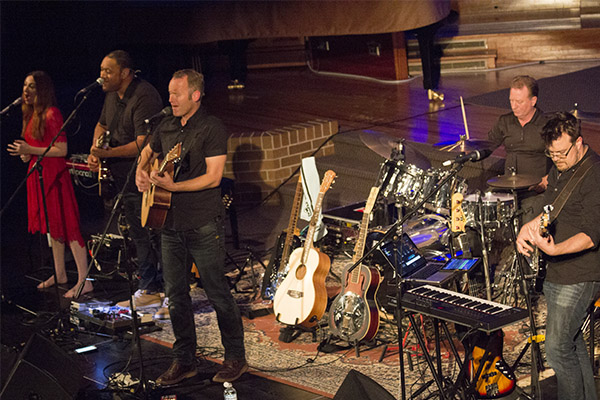Sons of Korah takes audience from hushed anticipation to joyful handclapping celebration
Sons of Korah
Avondale College Seventh-day Adventist Church, March 19, 2016
A well-earned encore closed Sons of Korah’s passionate reimagining of the biblical psalms in a performance as part of the Avondale Concert Series this past Saturday (March 19).
The five-piece folk band incorporated elements of Arabic, Latin and Celtic music as it took an audience of about 300 in Avondale College Seventh-day Adventist Church from hushed anticipation to joyful handclapping celebration.
“We last played here 10 to 15 years ago,” said leading member Matthew Jacoby from the stage. “It’s great to be back in this beautiful venue.”
The intervening years have not dampened the enthusiasm of the band—the members were clearly enjoying themselves during high-spirited flamenco songs such as Psalm 117 and there was plenty of unscripted banter between others.
Musically, Sons of Korah is tight, with each member needing only to glance at another or Jacoby to play an opening chord to signal a change in plan. Technical issues with lead guitarist Bruce Walker’s pedalboard were smoothly papered over.
One of the highlights: a recounting of the story of David and Bathsheba from 2 Samuel 11-12. A brooding synth soundscape undergirded Jacoby’s almost verbatim recital. The haunting call of Walker’s duduk, the Armenian oboe, combined with flourishes from backing vocalist Ann-Maree Keefe, added undeniable pathos. Woven through the story were psalms, selected to highlight David’s experience of grief and repentance.
No question: reintroducing music gives these ancient texts new depth and an emotional texture that would be difficult to experience in any other way. Sons of Korah’s lyrics stay as close as possible to the biblical text.
Musically, that’s risky, as the psalms, even in their original Hebrew, have no rhyme or meter—scholars have little knowledge about the original rhythms and melodies. The problem is compounded, of course, when the psalms are translated into English and when western musical expectations are added. To solve the conundrum, Sons of Korah often abandons standard verse-chorus-bridge song structures.
Yes, Sons of Korah sometimes packs too many words or syllables into a musical phrase, but the band’s commitment to the integrity of the text leads it mostly into truly creative and undeniably successful songwriting territory. Perhaps it is no surprise Avondale Conservatorium, Avondale Seminary and Manifest, the community of faithful creatives, presented the concert.
The inclusion in the set of “angry psalms” such as Psalm 94—“Oh Lord who avenges . . . rise up” would have challenged some in the audience. Those attending Jacoby’s lecture in Watson Hall Lecture Theatre that afternoon heard in the song’s growling, pounding intensity an authentic and very human call for God’s justice to be unleashed on the oppressor. Spiritual expressions are not romanticised—they’re authentic and honest, said Jacoby. Gutsy and relational spirituality goes beyond the prayer of token piety. Jacoby called the range of expression in the psalms as counter-cultural in a modern church context.
Sons of Korah has been leading Australian and international audiences into deeper encounters with the psalms since 1994. The band has adapted more than 50 psalms in that time. That’s an impressive discography, but it’s gratifying to know there are nearly 100 more psalms awaiting the Sons of Korah treatment.
Share

